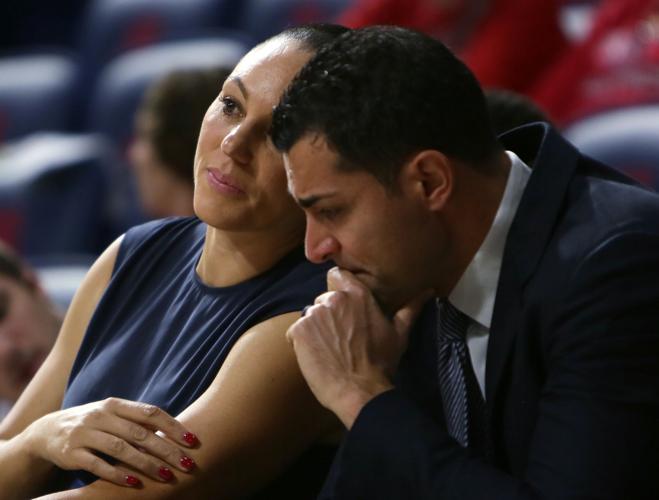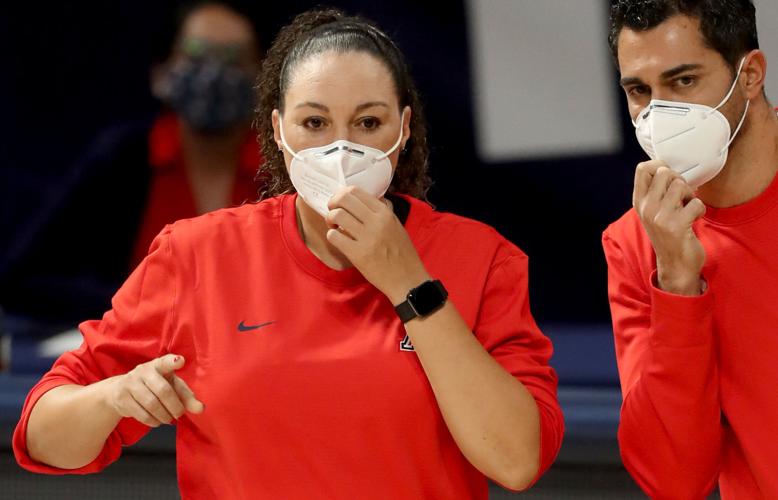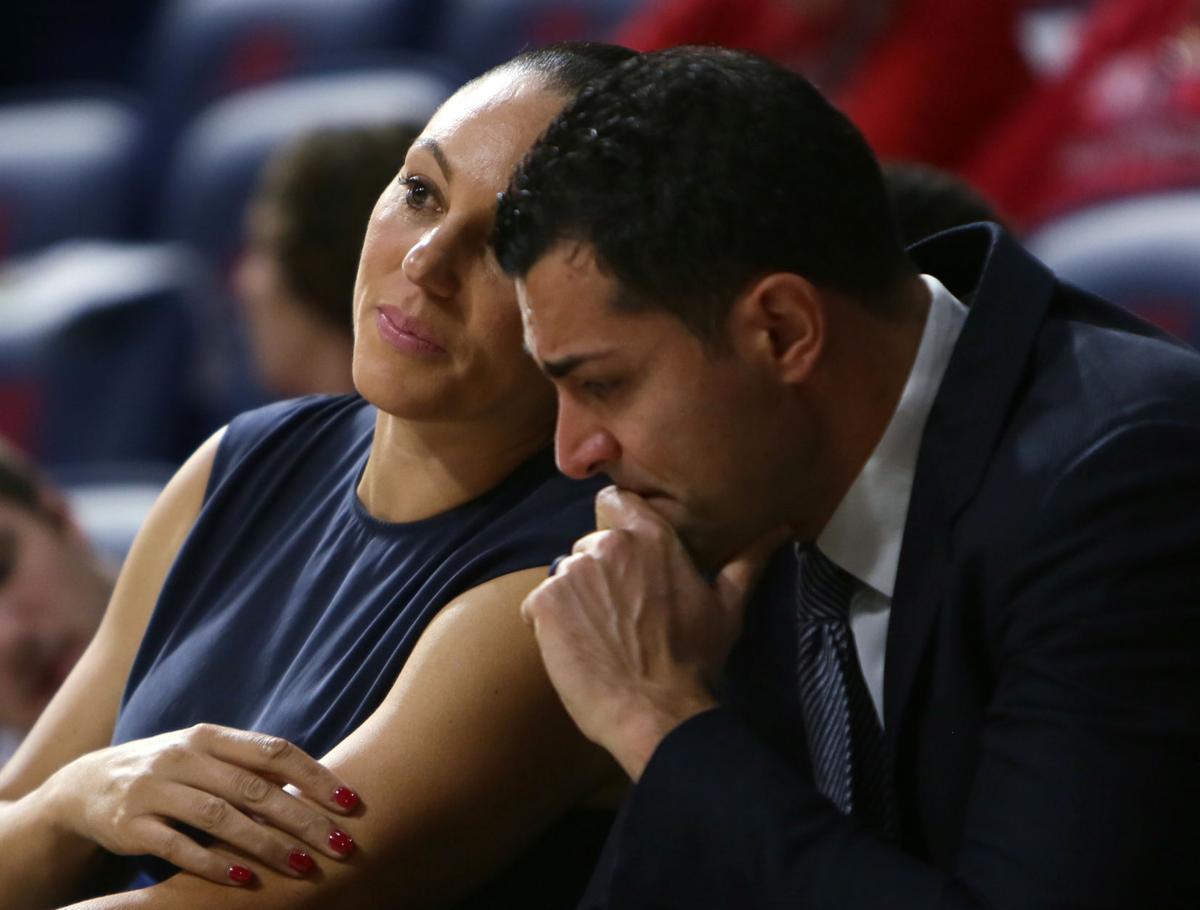The most uptight coaching matchup of Adia Barnes’ career hasn’t been against Stanford mega-winner Tara VanDerveer and it won’t be against UConn’s imposing Geno Auriemma at Friday’s Final Four.
It was against her husband, Salvo Coppa.
Imagine the scenario as it played out on a Sunday afternoon in December 2013 at Washington’s Hec Edmundson Pavilion. Barnes was an assistant coach for the Huskies. Coppa was an assistant coach for Montana State.
Husband vs. Wife. You won’t run across that one in any coaching manual.
Guard Aari McDonald, the soul of the 2020-21 Arizona Wildcats Women's Basketball team. Video by Rick Wiley / Arizona Daily Star
Until that day, Coppa’s first season as a college basketball coach had gone relatively well — except for the loneliness of living 700 miles apart from his wife.
The Bobcats had steadily won nonconference games, beating Cal State Northridge, Montana-Billings, Denver and the University of Great Falls, but had no chance against a growing power of Pac-12 women’s basketball. The Huskies won 83-60. Kelsey Plum, the future NCAA player of the year, toyed with the defense that Coppa installed for MSU coach Tricia Binford.
“Don’t remind me about it,” Coppa said with a laugh the other day. “Washington killed us. Adia likes to bring it up every now and then.”
Unlike football, where defensive coordinators and offensive coordinators are paid hundreds of thousands of dollars and become mini-celebrities, basketball assistant coaches sit on the bench and do their work behind the scenes.
Outside of McKale Center, Coppa has been known as “Adia’s husband” more than for his role as a master defensive coordinator, one of the forces of Arizona’s climb from a 6-24 season to the Final Four.
“I love Salvo. I love that guy,” says UA All-American point guard Aari McDonald. “He cares about you and your well-being. He knows his basketball stuff. He’s definitely a defensive guru.”
He’s almost overqualified, if that’s possible.
Coppa grew up a coaching prodigy in Italy, the son of Santino Coppa, who coached Euro League teams for almost 50 years, ultimately winning the Euro Cup. Salvo Coppa became a head coach for 10 years in Europe and Asia. He was only 30, perhaps destined to coach Italy’s women’s Olympic team someday.
Everything changed prior to an Italian League game. A forward from an opposing team, Pollacanestro Pozzuoli, walked past him in a corridor.

Arizona head coach Adia Barnes, left, gets some intel from assistant coach Salvo Coppa as the Wildcat take on Arizona State at McKale Center, Tucson, Ariz., December 10, 2020.
Even though they didn’t know one another, Coppa gave Adia Barnes a high five.
“We played the game — and I want to make note that we won that game — so I did not disturb Adia afterward,” Coppa recalls. “But somehow I got her phone number.”
He called twice. Barnes did not respond. He waited 10 more days and called again.
“I told myself, ‘This is the last time I’ll call,’ but this time she answered. I introduced myself as the coach of an opposing team and she was very surprised,” he said.
Their phone calls increased in frequency. After the Euro Cup championships, they went out to dinner. In the offseason, when Barnes returned to Seattle to work in her role as a radio analyst for her old WNBA team, the Seattle Storm, Coppa made his first visit to America.
Yada yada yada, he gave up his EuroLeague coaching career, moved to Seattle and two years later married Barnes, who had retired from basketball to become an assistant coach at Washington.
Then came what he calls “one of the hardest moments for us.”
Wishing to continue his coaching career, Coppa and Barnes decided he needed to do more than be a volunteer coach for the Storm or work in skill development for women’s ballplayers in the Seattle area.
He applied for the Montana State job, got it and moved to Bozeman. Talk about your leaps of faith.
“I learned how college basketball works, and that was very important,” he says. “But it was a year of adversity as well. I had lived in four cities in two years, coaching in Thailand and Bangkok for the Asian Games, then to Seattle and Bozeman. I was by myself, without Adia. It was a great learning experience, but after one year I decided it would be better to return to Seattle and be with Adia. I would start again from zero.”
Coppa got a job coaching at Mount Rainier High School. Now he’s in the Final Four, a defensive coaching wizard, having implemented an uber-aggressive press-and-deny defense he learned from EuroLeague legend, Ettore Messina, who helped coach Gregg Popovich’s San Antonio Spurs to the 2014 NBA championship.
“Salvo’s had a huge impact,” says UA senior Sam Thomas. “He loves what he does; you can tell by the way he coaches.”
More impressive, he has willingly stepped into the background so his wife can follow her coaching dreams, adeptly handling one of the most unique coaching situations in college basketball.
“He’s sacrificed a lot,” Barnes said in a Zoom conference Wednesday.
Barnes handles Arizona’s offense, recruiting, the day-to-day drama that comes with any college basketball group and is the face of a growing national power. Coppa coaches defense and serves as an on-call font of basketball knowledge that comes from more than two decades of coaching. More than anything, they are the parents to Matteo, 6, and Capri, six months.
Can you imagine how entertaining a reality show about the lives and times of Adia Barnes and Salvo Coppa in 2020-21 would be?
“Salvo is a great basketball mind,” says Barnes. “We learned differently: I come from a player’s background; he comes from a coaching background. He has great poise. He’s very good at skill development and tactical situations. We make a good team.”
What’s next? Barnes is only 43. Her head coaching career is just getting started. Coppa, 41, has willingly gone from head coach to co-pilot. Four days ago he helped his wife navigate a landing at the Final Four. What a story.






